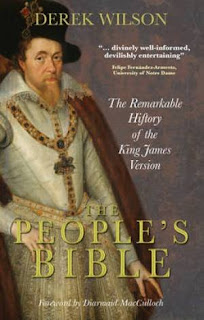2011 was the 400th anniversary of the first publication of the King James Bible. As a result, a number of books detailing the history of The Book were published to commemorate the occasion. The one I read was The People's Bible. The Remarkable History of the King James Version by Derek Wilson. I found it to be an insightful and enjoyable read. Wilson looks at the history of the KJV from the century before its publication to today, charting the changing religous and cultural climate that lead to its publication, and analysing its enduring influence.
Two aspects of the book particularly stood out for me. First, his portrayal of the situation prior to 1611 is vivid and memorable. The description of religious ritual in the setting of a primarily illiterate rural population evokes images of a way of 'doing' Christianity that is very different from the way it tend to be done in the Western world in this day and age. Furthermore, while the distribution of contraband bibles to believers desperate to read the Word of God in their own language is still a reality for many people in many countries, it is incredible to think that English speakers were in this very situation five centuries ago.
The second aspect that stood out was Wilson's discussion of the lasting influence of the King James Version of the Bible, and the questions that are still very relevant today. Should everybody be able to read and interpret the bible? Or should it be reserved for those who have undergone the training necessary to understand it deeply? How does the process of translation link into the belief that the Bible is the inspired Word of God, and the authority that belief engenders? He contends that the increasing number of English translations of the Bible hinders the memorisation of scripture. While this may not be true at an individual level, in the community of faith generally, the lack of a single standard translation makes it more difficult to build "religous currency" that "strengthen[s] fellowship and reaffirm[s] belief" (pg 197). This hindrance though is tempered by the impression one gets that Wilson considers the ideal of a single most accurate English translation that all parties agree upon to be something of a chasing of the wind.
Readers of this blog will know that I like my software to be open-source. I like my religion to be open-source too. It is a bold statement by the Bible to claim to be the Word of God, and a bold statement by the Church to claim to point to the Saviour of humanity. The Church has devoted considerable energy to ensuring that these claims can be evaluated by people for themselves. Not only does this include the translation of the Bible into as many languages as possible, but also the publication of the Bible in Greek and Hebrew. The result being that the Bible is probably the most scrutinised and studied document in the world. The Bible has a significance about that few other pieces of literature possess, and which demands careful consideration of its contents. It is well worth a read.
References:
McGrath A. 2001. In the Beginning: The Story of the King James Bible. London
Wilson D. 2010. The People's Bible. The Remarkable History of the King James Version. Lion: Oxford.
Subscribe to:
Post Comments (Atom)

1 comment:
"I like my religion to be open-source too."
You might be interested in this guy's reasons for using the KJV.
Especially his third point about the ownership of the Bible. He says the KJV is the last of the translations in the public domain - in the church's hands rather than the academy and big publishing houses.
Post a Comment